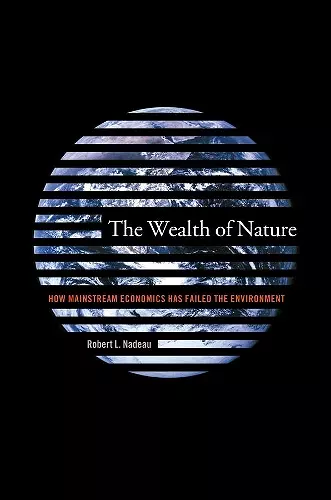The Wealth of Nature
How Mainstream Economics Has Failed the Environment
Format:Hardback
Publisher:Columbia University Press
Published:11th Jul '03
Currently unavailable, and unfortunately no date known when it will be back

This provocative book explains why neoclassical economic theory cannot account for the costs of doing business in the global environment. Nadeau demonstrates that the myth that neoclassical economic theory is a science has blinded us to the fact that this theory does not account for the environmental impacts of economic activities or posit viable economic solutions to environmental problems. The unfortunate result is that the manner in which we are now coordinating global economic activities is a program for ecological disaster. Nadeau argues that we must develop and implement an environmentally responsible economic theory and describes how this can be accomplished.
Demonstrates that the claim that neoclassical economics is a science comparable to the physical sciences is totally bogus and that our failure to recognize and deal with this fact constitutes the greatest single barrier to the timely resolution of the crisis in the global environment.Virtually all large-scale damage to the global environment is caused by economic activities, and the vast majority of economic planners in both business and government coordinate these activities on the basis of guidelines and prescriptions from neoclassical economic theory. In this hard-hitting book, Robert Nadeau demonstrates that the claim that neoclassical economics is a science comparable to the physical sciences is totally bogus and that our failure to recognize and deal with this fact constitutes the greatest single barrier to the timely resolution of the crisis in the global environment. Neoclassical economic theory is premised on the belief that the "invisible hand"- Adam Smith's metaphor for forces associated with the operation of the "natural laws of economics"-regulates the workings of market economies. Nadeau reveals that Smith's understanding of these laws was predicated on assumptions from eighteenth-century metaphysics and that the creators of neoclassical economics incorporated this view of the "lawful" mechanisms of free-market systems into a mathematical formalism borrowed wholesale from mid-nineteenth-century physics. The strategy used by these economists, all of whom had been trained as engineers, was as simple as it was absurd-they substituted economic variables for the physical variables in the equations of this physics. Strangely enough, this claim was widely accepted and the fact that neoclassical economics originated in a bastardization of mid-nineteenth-century physics was soon forgotten. Nadeau makes a convincing case that the myth that neoclassical economic theory is a science has blinded us to the fact that there is absolutely no basis in this theory for accounting for the environmental impacts of economic activities or for positing viable economic solutions to environmental problems. The unfortunate result is that the manner in which we are now coordinating global economic activities is a program for ecological disaster, and we may soon arrive at the point where massive changes in the global environment will threaten the lives of billions of people. To avoid this prospect, Nadeau argues that we must develop and implement an environmentally responsible economic theory and describes how this can be accomplished.
Of inputs, outputs, and invisible hands: a prolegomenon to a future economics that takes environmental costs fully into account... there's a new accountant in town, and he's counting megawatts and felled forests. Kirkus Reviews This well-annotated, scholarly treatment of a dense subject is written in a lively style. Publisher's Weekly The Wealth of Nature makes a convincing case that there is no logic in assuming that neoclassical economics can account for the environmental impacts of economic activities or indeed find economic solutions to environmental problems... The book has already been acclaimed as 'an important book on a critical issue' that will help readers to understand the weakness of much of the argument that surrounds conventional economic thinking. -- J. N. R. Jeffers International Journal of Sustainable Development A valuable and very timely book, one that should be read by anyone interested in economics and ecology in our rapidly changing global economy. -- Dale Toweill Science Books & Films ...effective introductions to vitally important topics notoriously difficult to do justice to... -- Zoe Young Times Literary Supplement (Economics) The connections he makes between economies and the natural sciences are as fascintating as they are inspired. His ideas are unique, packed with substance, and bundled together with persuasive arguments. -- Todd Wellnitz Ecology This author is to be applauded for...initiating what should be a new conciliatory dialogue on economics and the environment -- Christopher P. Dunn Quarterly Review of Biology
ISBN: 9780231127981
Dimensions: unknown
Weight: unknown
336 pages